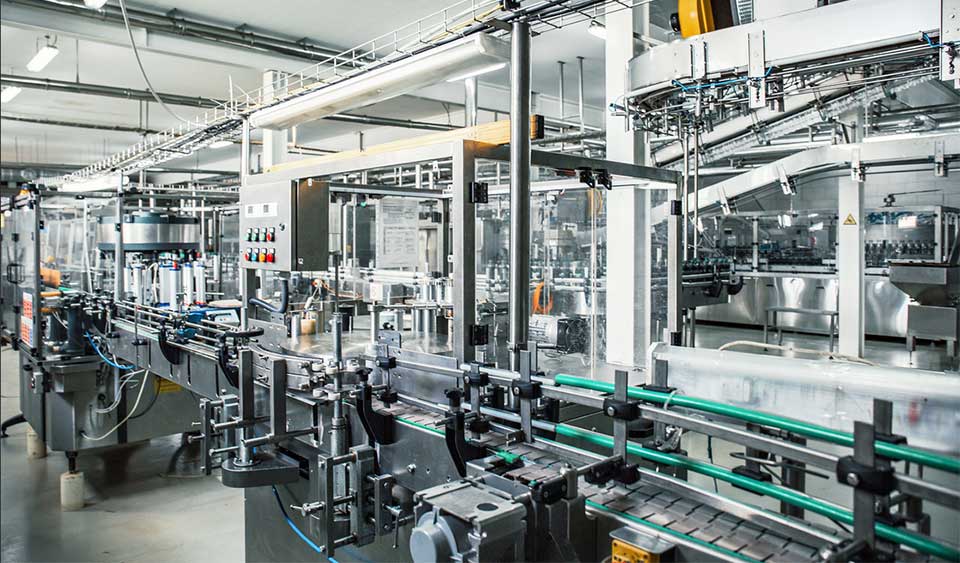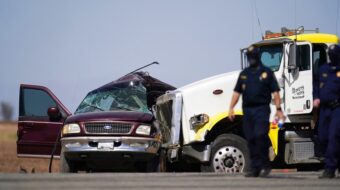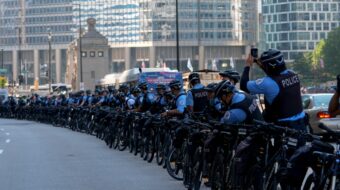
GURNEE, Ill.—Leily Lopez Hernandez, 29, went to work just before Christmas two-and-a-half years ago as a night-shift cleaner at the Miracapo Pizza Company in the Chicago suburb of Gurnee. She didn’t realize how hazardous it was. She never got the chance.
Lopez Hernandez, a Honduran immigrant, was cleaning with a compressed air hose and blow gun when an operating ambient spiral conveyor caught her hair at 1 a.m. It sucked her in. Nobody had turned off the machine beforehand or trained her how to shut it down before she began work.
In the laconic words of the Occupational Safety and Health Administration report of what happened: “The employee was found decapitated under the moving equipment when a coworker came to retrieve the compressed air hose and air blow gun.”
OSHA fined the firm $2.843 million for 29 violations surrounding her death, and fined the Waukegan, Ill., temp company that sent Lopez Hernandez to the Gurnee plant another $329,000 for not checking the working conditions beforehand.
OSHA also put Miracapo on its “severe violators” list, earmarked for special inspections, because two workers lost fingers in whirring machines weeks before Lopez Hernandez was killed.
“The working conditions were horrible,” alternating between extreme cold and extreme heat inside the Gurnee pizza plant, worker Meidy Ramirez told a Zoom press conference on April 24. “If we got sick, they threatened to fire us if we refused to work.” Fear prevents the workers, many of them migrants who could face deportation, from taking action. The plant is non-union. “And they take retaliation.”
So this year, Miracapo landed on the National Council of Occupational Safety and Health’s “Dirty Dozen” list. Asked if there were any changes since Lopez Hernandez’s death, Ramirez replied, “No, nothing has changed. But I hope being on the Dirty Dozen list puts some pressure on.”
This Dirty Dozen year’s list actually has 13 firms. There are a regular 12, plus one:” Amazon. NACOSH co-Executive Director Jessica Martinez explained the monster warehouser and shipper has made the list so many times and for such a wide range of job safety and health violations, that it winds up atop NACOSH’s careful survey of members, local affiliates, and workers every year.
A category all its own
With so many dangers to its workers, NACOSH put Amazon, owned by one of the world’s richest people, Jeff Bezos, in a category all its own.
“Amazon lands in the penalty box as a repeat Dirty Dozen offender due to its massive size, resources, and influence, dangerous working conditions that trap employees in cycles of injury and poverty; and a workforce that refuses to accept the status quo,” which includes extremely low pay to a mostly Black and brown workforce, NACOSH said.
“Injury rates at Amazon are 71% higher than in non-Amazon warehouses with over 1,000 employees. Some injured Amazon workers have been forced to use GoFundMe to pay bills. Unwilling to be stopped by this mega-employer, workers have organized for unions and protested, including an estimated 600 Amazon workers who joined in a strike or picket in December 2024.”
NACOSH publishes its Dirty Dozen every year to highlight how employers put profits before people, even to endangering their lives by failing to fix hazardous working conditions, or killing them. In 2023, the last full year of available federal data, 5283 workers died, the year after Lopez Hernandez did.
This year, besides the individual firms named to the Dirty Dozen—including at least one nationally known giant exploiter, McDonald’s—NACOSH also highlighted a growing threat to all workers: Heat.
Especially extreme heat as a result of climate change and global warming. And, as his actions show, Republican President Donald Trump doesn’t care about that. NACOSH does.
“As the climate crisis accelerates, extreme heat is becoming one of the deadliest workplace hazards,” it declares. “In the past three years alone, hundreds of workers have died, and tens of thousands have suffered heat-related illnesses, disproportionately impacting Black, brown, immigrant, and low-wage workers.”
Between 2011 and 2020, an estimated 33,890 workers experienced heat-related illnesses, resulting in lost workdays–a figure widely considered to be a vast underestimate. Many workers toil in high-risk industries without basic protections, such as clean drinking water, shaded rest areas, or paid breaks. The National COSH Network is organizing to change this reality. Through our Fired Up! campaign, we are building worker power and demanding enforceable heat standards, greater accountability, and employer responsibility.
“Many employers among the Dirty Dozen “continue to deny basic protections even as temperatures rise, prioritizing profit over lives. This crisis is more than just a workplace issue. It is a public health emergency, a racial justice crisis, and a fight for climate justice. Worker safety must be at the center of our climate response,” NACOSH’s report declares.
Another harrowing story, and one of rampant corporate greed and worker exploitation, came from an anonymous former prisoner jailed for a year and a half from 2021-23 in an institution run by the Geo Group, one of the nation’s two largest private prison firms.
GEO’s stock price—and business—is skyrocketing as Trump’s ICE raids sweep up undocumented workers and dump them in private prisons and camps. The man, now out, is anonymous because he’s now “in litigation” over his immigration status and fears retribution.
Geo is a $4 billion-a-year corporation. It holds inmates in inhumane conditions and often leases them out to private businesses to exploit. The businesses pay state governments hundreds of thousands of dollars each for the right to “rent” the prisoners. For work inside the prison, inmates earn a dollar a day. The anonymous ex-inmate said conditions inside are atrocious.
Hunger and mental torture
“You go hungry and go through mental torture,” he said. During the pandemic, on jobs prisoners toiled at inside, “We never got personal protective equipment, masks, glasses, none of it. They called it a voluntary job, but everybody knew it wasn’t.
“Every breath I took reminded me that Geo viewed us as a profit.” Most of the breaths were inside, where prisoners routinely were exposed to chemicals, especially when cleaning. “And when we spoke up, they took away our yard time,” which was an hour daily.
Geo also restricted phone calls, family visits, and food from the prison commissary, charging the prisoners high prices for the food and the calls. The commissary “food was rotting, and the milk was sour or like cheese. And if you were hurt and went to the doctor, he’d say, ‘Here’s water and a Tylenol.’
“This is what Geo does, and this is what our government pays them to do.”
Ironically, former Democratic President Joe Biden promised during his 2020 campaign to take business away from private prison firms. But once in office, he didn’t. That let Geo keep warehousing prisoners, and it will jail even more due to ICE sweeps.
Commented NACOSH co-director Martinez: “This industry reminds me very much of slavery.”
McDonald’s worker Pamela Mejia from Santa Clara, Calif., described bad working conditions and sexual harassment on the job. When she complained to supervisors, she discovered one of her colleagues was transferred to another location for the same reason. Her workweek was cut from 40 hours to 15. “There was also violence on the job, and pest infestation in the restaurant.” Mejia has hooked up with a union organizing drive at McDonald’s.
Yanelia Ramirez was abruptly fired in February, after toiling at Envy Nails, a New York City salon. “They didn’t provide protection, though we were working with chemicals,” she says. “There was a lot of wage theft, but the majority of workers are immigrants and afraid to discuss it.”
Besides Amazon, the Dirty Dozen includes another repeat offender: Mar-Jac Poultry of Georgia. Conditions at its processing plant are so bad, NACOSH said, that OSHA “sought a ‘hot goods’ injunction to halt the sale of its products.” Among Mar-Jac’s crimes against workers: Extensive use of child labor, one of whom, Duvan Perez, 16, was killed on the job two years ago. He was the third worker to die since 2020.
Mar-Jac’s machines Perez worked on “lacked basic safety protections,” and OSHA levied $200,000 in fines against it for “entanglement in machinery, electrocution, and falls.” After finding six kids working on the kill floor, “deboning poultry and cutting carcasses,” OSHA tried to shut it down.
The stories illustrate one more point the report makes: Workers of color, especially Spanish-named workers, are more likely to suffer exploitation on the job and more likely to fear speaking out. And that’s even before Trump’s stepped-up ICE raids targeting people with brown skin.
“From construction sites and agricultural fields to poultry plants and warehouses, they face unsafe conditions, poverty wages, and systemic neglect,” NACOSH’s Ramirez said, quoting from the report. In 2023, Latino workers suffered the highest fatality rate of any racial or ethnic group at 4.4 deaths per 100,000 full-time workers, well above the national average of 3.5.
“That same year, 839 of the 1,250 Latino workers who died on the job were foreign born, with private construction alone accounting for nearly 40% of those deaths. These are not accidents; they are the predictable result of unsafe, exploitative labor practices that sacrifice immigrant lives for profit.”
The entire report is available at www.nationalcosh.org.










